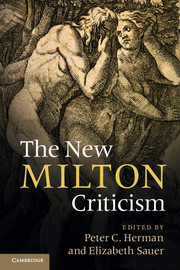Book contents
- Frontmatter
- Contents
- Notes on contributors
- Acknowledgments
- Note on editions
- Introduction Paradigms lost, paradigms found: the New Milton Criticism
- Part I Theodicies
- Part II Critical receptions
- Chapter 7 Against fescues and ferulas: personal affront and the path to individual liberty in Milton’s early prose
- Chapter 8 Disruptive partners: Milton and seventeenth-century women writers
- Chapter 9 Eve and the ironic theodicy of the New Milton Criticism
- Chapter 10 Man and thinker: Denis Saurat, and the old new Milton criticism
- Chapter 11 The poverty of context: Cambridge School History and the New Milton Criticism
- Chapter 12 Afterword
- Index
- References
Chapter 7 - Against fescues and ferulas: personal affront and the path to individual liberty in Milton’s early prose
Published online by Cambridge University Press: 05 June 2012
- Frontmatter
- Contents
- Notes on contributors
- Acknowledgments
- Note on editions
- Introduction Paradigms lost, paradigms found: the New Milton Criticism
- Part I Theodicies
- Part II Critical receptions
- Chapter 7 Against fescues and ferulas: personal affront and the path to individual liberty in Milton’s early prose
- Chapter 8 Disruptive partners: Milton and seventeenth-century women writers
- Chapter 9 Eve and the ironic theodicy of the New Milton Criticism
- Chapter 10 Man and thinker: Denis Saurat, and the old new Milton criticism
- Chapter 11 The poverty of context: Cambridge School History and the New Milton Criticism
- Chapter 12 Afterword
- Index
- References
Summary
In 1645, before lapsing into a four-year, perhaps sullen and disappointed, prose silence, Milton had a few final shots for his anonymous adversary who had dared challenge, in print, his opinion on divorce. In the penultimate paragraph of the vituperative Colasterion (1645), he dismisses once more the author of An Answer to a Book, Intituled, The Doctrine and Discipline of Divorce, tiredly expressing his disdain for his lowly opponent and wishing for a more worthy foe to debate:
And if hee have such an ambition to know no better who are his mates […] if in this penury of Soul hee can bee possible to have the lustiness to think of fame, let him but send mee how hee calls himself, and I may chance not fail to endorse him on the backside of posterity, not a golden, but a brazen Asse. Since my fate extorts from mee a talent of sport, which I had thought to hide in a napkin, hee shall bee my Batrachomuomachia, my Bavius, my Calandrino, the common adagy of ignorance and overweening. Nay perhaps, as the provocation may bee, I may bee driv’n to curle up this gliding prose into a rough Sotadic, that shall rime him into such a condition, as instead of judging good Books to bee burnt by the executioner, hee shall be readier to be his own hangman. Thus much to this Nuisance.
(CPW 2:757)The abrupt dismissal of his opponent at the close of this passage is typically sharp Miltonic polemic: a contemptuously short and simple closure to the lengthy, learned, and angry periods that immediately precede it. But the ease and shortness of his farewell to his adversary also points up, by contrast, the fact that Milton had dignified this low-born and unlearned “Servingman” with a detailed response and put this response into print. Indeed, one has to wonder, in the event of another answer from his opponent, whether “thus much” would have been enough. We might also wonder whether Milton’s subsequent silence was merely because of his increasing anger and isolation over what he saw to be the backtracking of Parliament and the Presbyterian party. Might it also have been occasioned by having no one to admonish and asperse after there was no answer to the challenge that he issued at the end of Colasterion?
- Type
- Chapter
- Information
- The New Milton Criticism , pp. 139 - 155Publisher: Cambridge University PressPrint publication year: 2012



